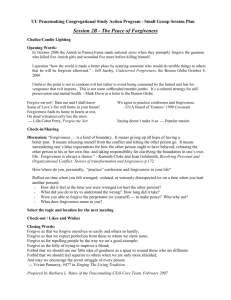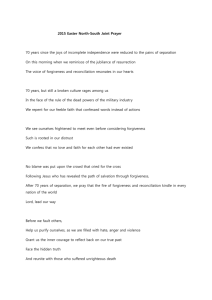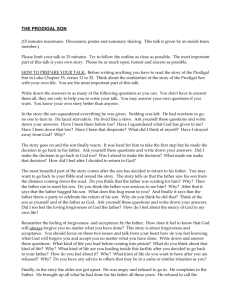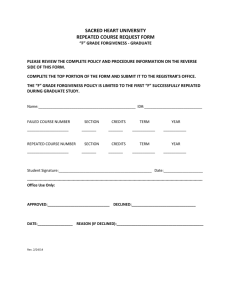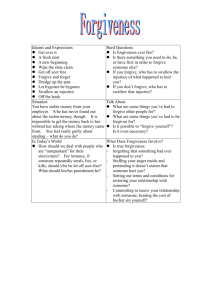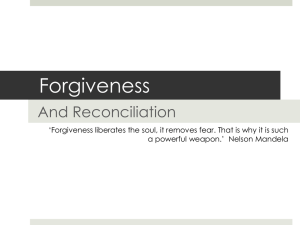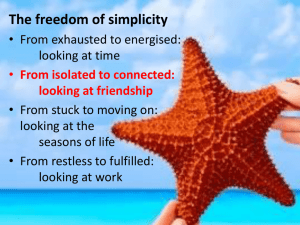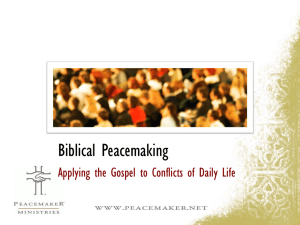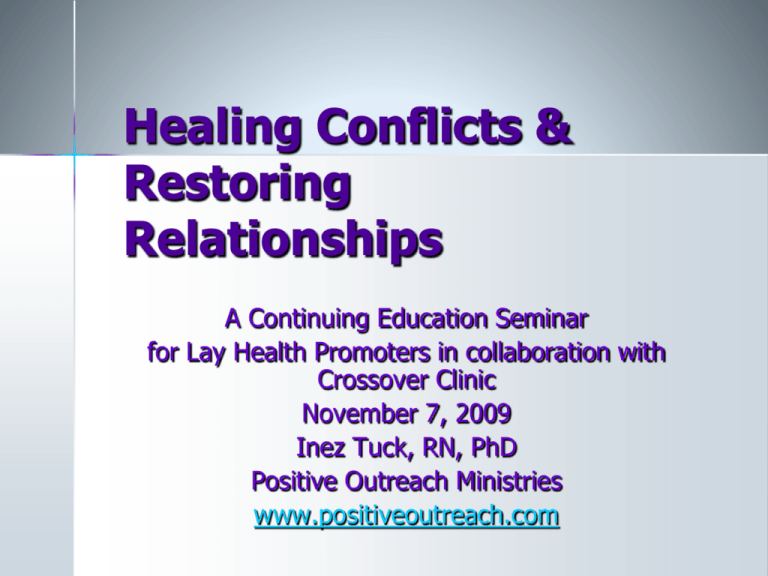
Healing Conflicts &
Restoring
Relationships
A Continuing Education Seminar
for Lay Health Promoters in collaboration with
Crossover Clinic
November 7, 2009
Inez Tuck, RN, PhD
Positive Outreach Ministries
www.positiveoutreach.com
Goals of the Presentation:
Describe the healing process.
Discuss forgiveness from multiple faith
traditions.
Explore the role of forgiveness in
reconciliation.
Practice the benefits of forgiveness for
one’s personal life and relationships.
Thoughts about Healing
Comes from the word “haelen” which means
wholeness; to be whole.
Means having a healthy body, mind and
spirit.
Requires a life that is balanced.
Self-healing is the process to learn.
Others can create the environment for
healing to occur.
Conflicts in Relationships
Conflicts occur when there are
differences in:
– Opinions
– Attitudes
– Values and standards
– Acceptable behaviors
– Desires, motivation, and intent
– Power and position status
Definitions
Forgive – to give up resentment; to
cease to feel resentment against
another.
Forgiveness – willingness or being able
to forgive; allowing room for human
error or weakness.
Merriam Webster Collegiate Dictionary, 2007
Definition of Forgiveness
“(a) Forgiveness is the acknowledgment of a
wrongful act, injustice or deliberate effort to
cause harm or pain and (b) the purposeful
response to ameliorate the hurtful situation
by moving on or letting go of the associated
feelings and thoughts (memories) and/or (c)
relieving others of judgment and blame.”
Tuck, 2006
Definitions of Forgiveness
“Forgiveness is taking seriously the
awfulness of what has happened when you
are treated unfairly. It is opening the door
for the other person to have a chance to
begin again. Without forgiveness,
resentment builds in us, a resentment which
turns into hostility and anger. Hatred eats
away at our well-being.”
Archbishop Desmond Tutu of South Africa, 1995
Summary Points
Human frailty is universal – found in
every society across all time.
– Immoral acts
– Illegal acts
– Sinful acts
Responses to these acts with
forgiveness are universal as well.
Universality of Forgiveness
Forgiveness in Monotheistic Religions
(one God)
Forgiveness in Eastern Thought
Forgiveness in secular terms – i.e.,
“accident forgiveness”
Forgiveness in judicial/legal terms
Islam
God promise you His forgiveness and
bounties.
Islam, Qur’an 2.268
And who shun the more heinous sins and
abominations; and who, whenever they are
moved to anger, readily forgive.
Islam, Qur’an 42:37
Christianity
I am he who blots out your transgressions for my
own sake, and I will not remember your sins.
Isaiah 43:45
Forgive us our sins, for we also forgive everyone
who sins against us.
Luke 11:4
Forgive our debts, as we forgive our debtors.
Matthew 6:12
Christianity
Get rid of all bitterness, rage and
anger, brawling and slander, along
with every form of malice. Be kind and
compassionate to one another,
forgiving each other, just as in Christ
God forgave you.
Ephesians 4:31-32
Judaism
Rosh Hashanah (the Jewish New Year)
and Yom Kippur (Day of Atonement)
are days or prayer and penitence.
Specific religious practices for dealing
with forgiveness and atonement.
Eastern Thought
Buddhist thought relates forgiveness to
love, acceptance, and freedom from
suffering.
Hinduism asserts absolution across past,
present and future lives. Shama or
forgiveness is seen with intent or
motivation.
Taoism encourages harmony with others;
“ I have forgiven their transgression”
Quote from Tract of the Quiet Way.
Why Forgiveness?
We should do it for moral, ethical reasons
Forgiving creates positive emotions within
both parties
Supports our values and beliefs
Strengthens one’s faith in God
Decreases negative emotions of depression,
bitterness, and anxiety
Channels positive feelings into the
environment – universe – world peace
Empowers and restores relationships
The work of
Forgiveness and
Healing Begins with
YOU!
Sometimes we ask for
Forgiveness
O merciful God,
I have acted out of fear and hurt others;
I have compromised my values;
I have abandoned my friends;
I have chosen a path of betrayal;
I have place my needs above others;
I have taken others for granted;
I’m not worthy of your grace
But ask for your forgiveness.
Tuck (2005), To Err is Human, p.16
Sometimes we require
Forgiveness from Others
I have been wronged
Or hurt
Or treated badly.
The COPE Model
Learning to Forgive
Claim
It!
Own It!
Plan It!
Enact It!
© A Path to Forgiveness, Tuck (2007)
The COPE Model
Claim
It!
Enact
It!
Forgiveness
Plan It!
Own It!
Step #1
Call It! Claim It!
Acknowledge the hurtful event
– What is the offense?
– Who was involved?
– Is this a minor infraction or a major
violation?
– What is the nature of the hurtful event?
Examples of 16 Hurtful
Situations
Feeling betrayed
Being violated
Experiencing a physical
violation
Feeling disrespected
Feeling Undervalued
or unappreciated
Holding a grudge
Your confidence is
broken
Being lied to or lied
about
Being taken advantage
of
Being abandoned
Feeling neglected
Being humiliated or
shamed
Invasion of privacy
Your identity stolen
Being Cheated
Feeling Misunderstood
Call It! Claim It!
(Your work)
Briefly describe the hurtful
event (2-3 sentences)
Step # 2 - Own It!
This critical phase is recognizing
and accepting your response to
the hurt.
– How did you respond?
– What level of hurt?
– Minor slight or life changing?
– What feelings remain?
Own It! (Your work)
Briefly describe your response to the
event.
– Identify 2-3 predominant feelings.
“Own” your response whatever it is!
– “Wrestle with emotions, thoughts, and
visceral response.”
– Defer making a judgment or
rationalization.
Own It!
Through self reflection and discernment
reach a
“tipping point”
Decide to Forgive
Step #3 Plan It!
– A thoughtful, rational process
– What do I want to accomplish?
– How do I achieve it?
– Is the person available?
– Are face-to-face interactions
desired?
– Is an apology or contrition required?
Plan It!
An intuitive and introspective process
– The “right thing” to do
– A moral requirement
– A religious preference
– Guided by your heart and not your
head
Plan It! (Your work)
What steps will you take in your
situation?
– List 2-3 ideas
– Are they achievable?
– Are you willing to do them?
3 Prong Process of
Forgiveness
1.
2.
3.
Offering an apology, sharing our
remorse and regret with others and
asking others to forgive you.
Feeling violated and asking others to
make amends and offer an apology
and then forgive them.
Coming to terms with and accepting
and offering forgiveness.
Step #4 - Enact or Do It!
Forgiving is challenging
It is possibly outside of your
comfort zone
It requires risk taking
Includes your support system
Requires personal commitment
Enact It!
While you are forgiving yourself or
others:
– Show empathy and compassion
– Stay focused on your intent to continue
the process to completion
– Use the legal system or mediation as
needed
– Implement self-care activities
– Attempt reconciliation of relationships
Enact It!
After forgiving
– Use coping strategies (what do you do
now?)
– Begin the process of healing that will take
time depending on the hurt
– Practice self-love and positive affirmations
– Seek peace and comfort in your faith
– Seek professional counseling if needed
Enact It!
Words of Wisdom!
Release the hurt and
FORGIVE!
You will know that forgiveness has begun when you recall those who hurt you and
feel the power to wish them well.
--Lewis B. Smedes
Benefits of Forgiveness
“Forgiveness is a way to let go of spiteful
emotions and painful memories in order to
create more space.
Forgiveness allows me to worry less.
In letting go of resentments, space is
created and joy can come in.
Out of emptiness, positive feelings grow.
Space is an opportunity to create anew.”
Tuck, To Err is Human, 2005
Resolve your Conflicts
Restore Relationships
Key Points! You must decide:
– When should you end the conflict?
– Why restore the relationship?
– How to restore the relationship?
– When to restore the relationship?
– When is it best to walk away from a
relationship?
– What type of relationship matters?
Personal? Work related? Church related?
Summary
Recognize the
conflict and try
to resolve it.
Start doing
your
“Forgiveness
Work” using
the COPE
Model
Then restore
your
relationships
and begin to
heal.
Final Words!
St. Theresa's Prayer
May today there be peace within.
May you trust God that you are exactly where you
are meant to be. May you not forget the infinite
possibilities that are born of faith. May you use
those gifts that you have received, and pass on the
love that has been given to you.... May you be
content knowing you are a child of God.... Let this
presence settle into your bones, and allow your
soul the freedom to sing, dance, praise and love.
It is there for each and every one of us.
Amen.
THANK YOU!
INEZ TUCK © 2009
ALL RIGHTS RESERVED
PERMISSION TO USE OR DISTRIBUTE THIS DOCUMENT OF
ANY PART OF THE DOCUMENT MUST BE GRANTED BY THE
AUTHOR.

